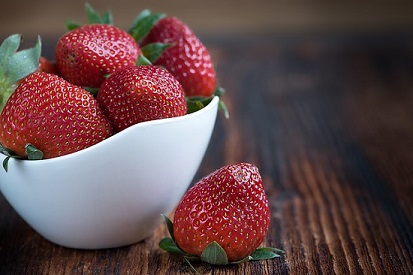Deakin scientist sweetens appeal of strawberries with new breed
New Deakin research has sweetened the appeal of one of Australia’s favourite but currently maligned fruits, the strawberry.
Deakin School of Exercise and Nutrition Sciences researcher Penelope Oliver spent several years testing strawberries to determine the most popular tasting elements of the fruit, before taking these aspects and writing the recipe for a new breed of strawberry to boost its popularity.
While the work was done over several years, the current timeliness of her research findings is not lost on Ms Oliver, with struggling Australian farmers in need of a boost in the wake of the current food-tampering scandal.
Ms Oliver, whose research was part of her PhD project with Deakin’s Centre for Advanced Sensory Sciences within the School of Exercise and Nutrition Sciences, will be among 2024 students graduating from this week at the Geelong Waterfront Campus, with another 1087 students graduating in absentia.
Deakin Vice-Chancellor Professor Jane den Hollander AO said nurturing and encouraging students to make a difference through world-class research was a fundamental goal of the University.
"For this week’s graduating class, one journey is over while another is about to begin," Professor den Hollander said.
"Their time with Deakin has given our graduates the skills, knowledge and values to create the future they deserve, and we encourages our students to develop a lifelong relationship with the University, from undergraduate to graduate to alumni to friend to partner.
"Our alumni are our most effective ambassadors and the best evidence of our success, making an ongoing contribution to the intellectual, social and economic life of the communities we serve."
Ms Oliver, who graduates today, said her research aimed to unlock the appeal behind strawberries, and lay out the potential for an Australian-specific plant variety – or "cultivar" – that could help local breeders become more significant players in the global production market.
"Strawberries are continually being crossbred to produce new and improved cultivars, and the aim of my research was to facilitate the Australian breeding program in the development of a variety with the ideal flavour," Ms Oliver said.
"A large portion of Australian-grown strawberries are from US breeding stock, and when grown in a different climate to the one for which they have been bred, the flavour of the strawberry is impacted. For example, the Californian-bred 'Albion' plant variety has an altered chemical composition when grown in Australia – our version has a lower sugar-to-acid ratio and a lower sweetness intensity.
"We could develop an Australian cultivar that is well adapted to the Australian climate, with a taste that better satisfies consumer needs, and is equivalent or superior in flavour to overseas competitors."
Ms Oliver conducted years of experiments with groups of taste testers to determine the exact taste profiles that make up the perfect strawberry.
"Strawberry flavour is a dynamic and complex combination of hundreds of chemicals, dominated with sweet, fruity, floral, green, peach, citrus and caramel attributes," she said.
"By finding the right balance of preferred attributes, I was able to identify two plant varieties that could be introduced by Australian breeders to have the broadest appeal in the Australian market.
"Despite their recent bad press, the production of strawberries is increasing both worldwide and within Australia. Australia is ranked 26th in the world for the production of strawberries, and there was a 40 per cent increase in strawberry production in Australia over the ten-year period prior to 2014.
"This steady increase in production over time suggests strawberries are in high demand. Their consumption rates are growing, and a new Australian variety could be a good way to tap into that growth and to counteract recent issues brought on by reports of food tampering."
Share this story

